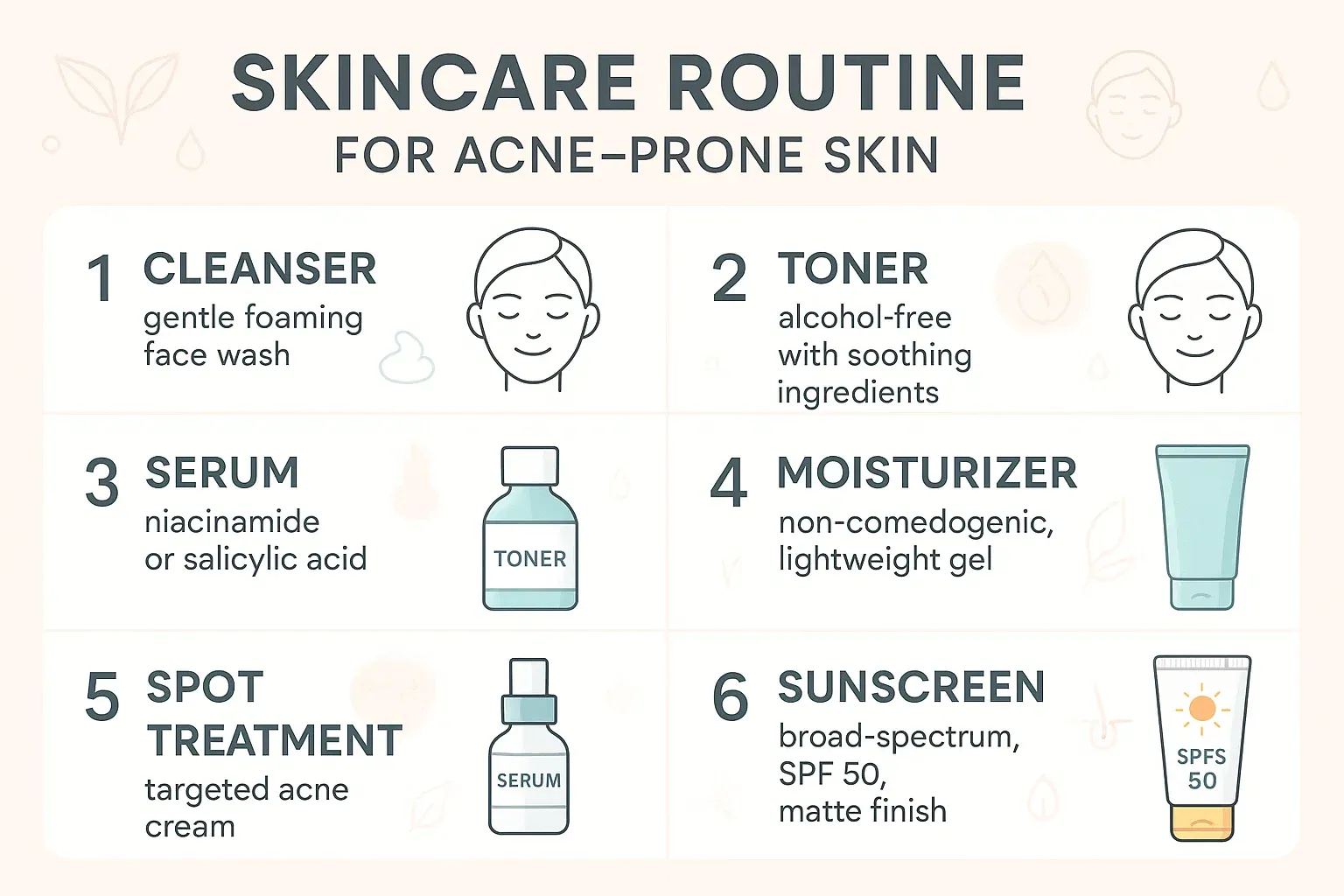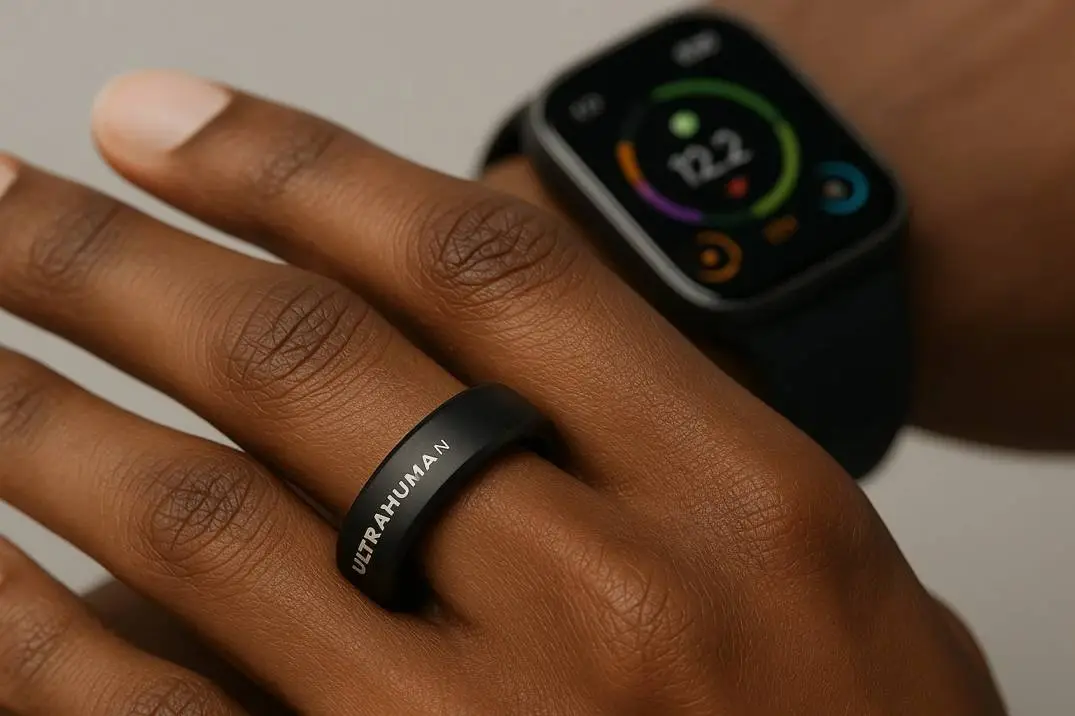Dealing with acne can feel like fighting a battle you can't win. Trust me, I've been there. After years of trying different products and making countless mistakes, I learned that having the right step-by-step skincare routine for acne-prone skin makes all the difference. When I first started my skincare journey, I made every mistake in the book. I over-washed my face, used harsh scrubs, and switched products every week. My skin got worse, not better. That's when I realized I needed a proper plan.
Today, I want to share everything I've learned about creating an effective acne skincare routine that actually works. This guide will help you build a routine that's gentle yet powerful enough to fight breakouts.
Understanding Your Acne-Prone Skin Type
Before diving into any routine, you need to understand what causes acne. Acne-prone skin happens when your pores get clogged with oil, dead skin cells, and bacteria. This creates the perfect storm for breakouts.
There are different types of acne:
- Blackheads (open comedones)
- Whiteheads (closed comedones)
- Papules (small red bumps)
- Pustules (pimples with pus)
- Cystic acne (deep, painful bumps)
Your skin type also matters. You might have oily acne-prone skin, combination skin with acne, or even dry skin that breaks out. Each type needs a slightly different approach.
I learned this the hard way when I kept using products for oily skin, even though mine was actually combination. Once I figured out my true skin type, my routine became much more effective.
The Step-by-Step Skincare Routine for Acne-Prone Skin: Morning Edition
Your morning skincare routine for acne sets the tone for the entire day. Here's exactly what I do every morning, and it's made a huge difference in my skin.
Step 1: Gentle Face Cleansing for Acne
Start with a gentle cleanser for acne-prone skin. I use a salicylic acid cleanser that removes oil without stripping my skin.
Wet your face with lukewarm water. Hot water can irritate acne-prone skin and make it worse. Apply a small amount of cleanser and massage gently for 30 seconds. Rinse thoroughly.
Pro tip: Never scrub your face hard. This can damage your skin barrier and make acne worse.
Step 2: Acne Treatment Products
This is where the magic happens. Apply your spot treatment for acne or acne serum while your skin is still slightly damp. I prefer benzoyl peroxide for beginners or niacinamide for sensitive skin. Start with a low concentration to avoid irritation. Wait 5-10 minutes before moving to the next step. This gives the treatment time to absorb properly.
Step 3: Moisturizer for Acne-Prone Skin
Many people skip moisturizer when they have acne. Big mistake! Even oily acne-prone skin needs hydration. Look for a non-comedogenic moisturizer that won't clog your pores. Lightweight moisturizers for acne work best during the day. I use a gel-based moisturizer that hydrates without feeling heavy or greasy.
Step 4: Sunscreen for Acne-Prone Skin
This step is non-negotiable. Sun protection for acne-prone skin prevents dark spots and scarring from getting worse. Choose a broad-spectrum SPF 30 or higher. Mineral sunscreens with zinc oxide work great for sensitive, acne-prone skin. Apply generously and reapply every 2 hours if you're outside.
The Step-by-Step Skincare Routine for Acne-Prone Skin: Evening Edition
Your nighttime skincare routine for acne is when the real healing happens. This is when I use stronger treatments and focus on repair.
Step 1: Double Cleansing Method
If you wear makeup or sunscreen, start with an oil cleanser for acne-prone skin. Yes, oil! The right oils actually help dissolve stubborn makeup and sunscreen without clogging pores. Follow with your regular gentle cleanser to remove any remaining impurities.
Step 2: Exfoliation for Acne-Prone Skin
Chemical exfoliation works better than physical scrubs for acne. I use BHA (salicylic acid) 2-3 times per week. AHA vs BHA for acne: BHA penetrates deeper into pores, making it perfect for acne-prone skin. AHA works better for surface-level concerns. Start slowly with exfoliation. Once a week is enough at first.
Step 3: Targeted Acne Treatments
This is when I apply my stronger treatments. Retinoids for acne work amazing, but start slowly to avoid irritation. Tretinoin, adapalene, or retinol for beginners all work well. Apply a pea-sized amount to your entire face, avoiding the eye area.
Step 4: Hydrating Serums and Moisturizer
Hyaluronic acid for acne-prone skin is a game-changer. It adds hydration without heaviness.
Follow with a slightly richer night moisturizer than what you use during the day.
Weekly Skincare Treatments for Acne
Once or twice a week, I add special treatments to boost my routine's effectiveness.
Clay Masks for Acne-Prone Skin
Bentonite clay masks and kaolin clay treatments help absorb excess oil and unclog pores. I use these when my skin feels particularly congested.
Leave the mask on for 10-15 minutes, then rinse with cool water.
Face Masks for Acne Prevention
Tea tree oil masks and charcoal masks for acne can help prevent future breakouts. Always patch test new ingredients first.
Common Skincare Mistakes with Acne-Prone Skin
I've made these mistakes, and I see others making them too:
Over-Washing Your Face
Washing your face more than twice a day can actually make acne worse. It strips your skin's natural oils, causing it to produce even more oil.
Using Too Many Products at Once
Skincare layering for acne should be gradual. Don't start 5 new products at the same time. Your skin needs time to adjust.
Skipping Moisturizer
Dehydrated acne-prone skin often produces more oil to compensate. Always moisturize, even if your skin feels oily.
Not Being Patient
How long for acne routine to work? Usually 6-12 weeks. I know it's frustrating, but consistency is key.
Building Your Personalized Acne Skincare Routine
Your personalized skincare routine for acne should match your specific needs. Here's how to customize it:
For Sensitive Acne-Prone Skin
- Use fragrance-free products
- Start with lower concentrations of active ingredients
- Focus on gentle skincare for acne
- Avoid harsh ingredients like high-concentration alcohols
For Oily Acne-Prone Skin
- Use gel-based products
- Include oil-control ingredients like niacinamide
- Consider stronger acne treatments
- Don't skip hydration for oily skin
For Combination Skin with Acne
- Use different products on different areas if needed
- Focus treatments on your T-zone
- Use lightweight formulas that won't clog pores
Budget-Friendly Acne Skincare Options
You don't need expensive products for great results. Here are my affordable acne skincare favorites: Drugstore cleansers with salicylic acid work just as well as expensive ones. Budget acne treatments like benzoyl peroxide are available at any pharmacy. DIY skincare for acne can be effective too, but be careful. Simple ingredients like honey masks and oatmeal scrubs are gentler than store-bought options.
Professional vs At-Home Acne Care
Sometimes professional acne treatments are necessary. Dermatologist recommendations include:
- Prescription retinoids
- Antibiotic treatments
- Chemical peels for acne
- Professional extractions
When to see a dermatologist: If your acne is cystic, leaving scars, or not responding to over-the-counter treatments after 3 months.
Lifestyle Factors for Clear Skin
Your skincare routine for clear skin isn't just about products. Diet and acne are connected for some people. Stress and breakouts definitely go hand in hand.
Sleep and skin health matter too. I notice my skin looks worse when I don't get enough sleep.
Exercise and acne can help by reducing stress, but always shower immediately after working out to prevent clogged pores.
Expert Opinions and Professional Insights
Dr. Sarah Chen, a board-certified dermatologist, emphasizes: "The biggest mistake I see with acne-prone skin is using too many harsh products at once. A gentle, consistent routine with proven ingredients like salicylic acid and benzoyl peroxide works better than complicated regimens."
Skincare expert Maria Rodriguez adds: "Patience is crucial with acne treatments. Most people give up after 2-3 weeks, but real results take 6-12 weeks of consistent use."
Frequently Asked Questions
Can I use multiple acne treatments at the same time?
Start with one active ingredient for acne and gradually add others. Using benzoyl peroxide and salicylic acid together can be effective but may cause irritation initially.
Should I pop my pimples?
Never pop pimples! This can lead to acne scarring and spread bacteria. Use spot treatments instead and let blemishes heal naturally.
What's the difference between acne-prone skin products and regular skincare?
Acne-fighting ingredients like salicylic acid, benzoyl peroxide, and retinoids are specifically formulated to target clogged pores and bacteria that cause breakouts.
How often should I change my skincare routine for acne?
Stick with a routine for at least 12 weeks before making major changes. Seasonal skincare adjustments might be needed, but core products should remain consistent.
Is natural skincare for acne as effective as conventional products?
Some natural acne treatments like tea tree oil and green tea can be helpful, but proven ingredients like salicylic acid and benzoyl peroxide typically show faster, more consistent results.
What should I do if my skin gets worse when starting a new routine?
Some initial purging from acne treatments is normal, especially with retinoids. However, if irritation is severe or lasts more than 6 weeks, consult a dermatologist.
Can diet affect my acne skincare routine results?
While skincare products for acne are most important, some people find that reducing dairy or high-glycemic foods helps improve their results.
Final Thoughts: Your Journey to Clearer Skin
Creating the perfect step-by-step skincare routine for acne-prone skin takes time and patience. What works for me might need tweaking for you, and that's completely normal.
The most important things I've learned:
- Consistency beats perfection
- Gentle products work better than harsh ones
- Skincare routine maintenance requires ongoing attention
- Professional help is available when you need it
Remember, having acne doesn't define you. It's a common skin condition that can be managed with the right approach. Building confidence with clear skin is possible, but your worth isn't determined by your complexion. Start simple, be patient, and don't be afraid to adjust your routine as needed. Your skin will thank you for the consistent care and attention. Clear skin journey isn't always linear, but with the right step-by-step skincare routine for acne-prone skin, you can achieve the healthy, comfortable skin you deserve.













